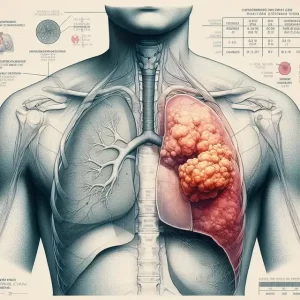Detecting Colorectal Cancer with Less than 1 Milliliter of Blood
- FDA Approved Opdualag: The First Immunotherapy Targeting LAG-3
- Cutaneous Reactions Following COVID-19 Vaccination: A Review of the Evidence
- Brief Intermittent Exercise Reduces Heart Disease and Death Risk
- Personalized Lung Tumor Chips Assess PD-1 Therapy Response
- Study Shows Prior Infection Offers Strong Immunity to Original COVID-19 Strain
- Chinese Food Products Dominate Korean Tables Amid Safety Concerns
Detecting Colorectal Cancer with Less than 1 Milliliter of Blood: Scientists Develop New Liquid Biopsy Technique
- AstraZeneca Admits for the First Time that its COVID Vaccine Has Blood Clot Side Effects
- Was COVID virus leaked from the Chinese WIV lab?
- HIV Cure Research: New Study Links Viral DNA Levels to Spontaneous Control
- FDA has mandated a top-level black box warning for all marketed CAR-T therapies
- Can people with high blood pressure eat peanuts?
- What is the difference between dopamine and dobutamine?
- How long can the patient live after heart stent surgery?
Detecting Colorectal Cancer with Less than 1 Milliliter of Blood: Scientists Develop New Liquid Biopsy Technique。
Colorectal cancer (CRC), a cancer that originates in the tissues of the colon or rectum, has become one of the most common malignant tumors worldwide, causing approximately 700,000 deaths annually.
Currently, many medical experts recommend colorectal cancer screening for individuals at medium to low risk starting at the age of 50. However, conventional screening methods such as colonoscopies or tissue biopsies are invasive, costly, painful, and potentially risky.
Consequently, many patients hesitate to undergo these procedures, potentially missing the optimal window for diagnosis and treatment. Clearly, there is an urgent need for a better diagnostic tool that can enhance the clinical experience.
In a new study published on September 8, 2022, in “Nature Biotechnology,” an international research team led by the Weizmann Institute of Science in Israel and the Hebrew University has developed a single-molecule-based liquid biopsy method that can detect colorectal cancer, pancreatic cancer, and a broader range of cancers and diseases with less than 1 milliliter of blood.
This method achieved an accuracy rate of 92% in detecting colorectal cancer, demonstrating its potential in diagnosing this form of cancer.

This non-invasive liquid biopsy method relies on the analysis of cell-free DNA (cfDNA). In healthy individuals, cfDNA mainly originates from the natural death of blood cells. cfDNA in plasma exists in the form of nucleosomes (cfNucleosomes) and maintains tissue- and cancer-specific epigenetic states. However, in cancer patients, a portion of cfDNA comes from circulating tumor DNA (ctDNA).
Currently, cfDNA-based liquid biopsy methods are in advanced stages of development, and sequence analysis based on ctDNA has been shown to reveal tumor-specific genetic alterations. However, these methods have limitations and unavoidable drawbacks due to the need for genetic differences (mutations) to distinguish normal and tumor DNA.
The recently developed liquid biopsy method now relies on epigenetics, which does not involve DNA mutations but rather focuses on cell genome modifications. However, these methods faced issues such as requiring too much blood from patients or only looking for single epigenetic changes, resulting in insufficiently reliable results.
In this new study, the team rethought epigenetic-based approaches and developed a technique called Epigenetic Profiling of Nucleosomes in Plasma (EPINUC), building upon their previous work with single-molecule imaging methods.
This method allows precise epigenetic mapping under a fluorescence microscope using minimal material. It can be used to observe epigenetic marks on nucleosomes, which are fragments of DNA wrapped around protein “spools.”
When cells are damaged, nucleosomes are released into the bloodstream, similar to debris. Thus, analyzing the millions of nucleosomes found in blood can also detect cancer.
Researchers used EPINUC to generate high-dimensional data composed of three layers of information: histone post-translational modifications (PTM), DNA methylation, and protein biomarkers. These data were collected from plasma samples of 33 healthy individuals and 63 late-stage colorectal cancer patients.
They found significantly higher levels of plasma nucleosomes in colorectal cancer patients compared to the healthy control group. EPINUC revealed significant epigenetic and biomarker changes in the plasma of colorectal cancer patients.
This analysis covered six different epigenetic modifications associated with cancer and various indicators of other cancers, including protein fragments from deceased tumors, which traditional techniques cannot detect.
Next, the team combined this cancer molecular biology revealed by EPINUC with artificial intelligence algorithms, applying machine learning to large datasets from two groups of individuals. They not only analyzed all cancer biomarkers but also explored their combinations and relationships.
To ensure that this new technology is not limited to colorectal cancer, researchers compared the plasma nucleosomes of healthy volunteers with those of 10 pancreatic cancer patients. The new technology distinguished between the healthy group and the cancer patient group with a record-breaking accuracy of 92%.
Finally, researchers combined EPINUC with direct single-molecule DNA sequencing to uncover the origin tissue of colorectal, pancreatic, lung, and breast cancers.
In summary, EPINUC technology provides multidimensional information of potential clinical relevance from less than 1 milliliter of liquid biopsy material, offering promise as an alternative tool to existing traditional screening methods.
Researchers state that due to the level of detail revealed by EPINUC technology, these diagnostic results can advance personalized medicine by tailoring the best treatment plans for each patient.
In the future, this technology may not only be used for diagnosing various cancers but also for detecting other diseases that leave traces in the bloodstream, such as autoimmune diseases or heart conditions.
Currently, the team is working to transition this recently completed proof-of-concept study into broader testing phases.
Detecting Colorectal Cancer with Less than 1 Milliliter of Blood: Scientists Develop New Liquid Biopsy Technique
Paper Link:
https://www.nature.com/articles/s41587-022-01447-3
(source:internet, reference only)
Disclaimer of medicaltrend.org
Important Note: The information provided is for informational purposes only and should not be considered as medical advice.



